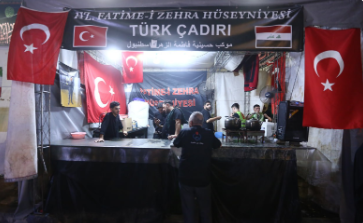You can see them—full of energy and enthusiasm, organized, and keeping everything clean and tidy. They came all the way from Istanbul to write their names in the register of the servants of the pilgrims of Abu Abdullah al-Hussein (peace be upon him). They serve food and drinks flavored with famous Turkish tastes. Although they hold Husseini rituals in their own country, the Arbaeen pilgrimage and the reward of serving during it hold a special, elevated status with God. That is why they insisted on offering this service every year with the help of their Iraqi brothers.
From Seed to Harvest
Standing at the head of the “Fatima al-Zahra” (peace be upon her) procession from the city of Ağdır in Istanbul, Sayyid Hussein al-Ridawi manages the work and gives instructions to his fellow servants. They hand out cold drinks to pilgrims to cool their bodies in weather where temperatures exceed the boiling point. Speaking to Noun News Agency, he said:
"The servants in the procession used to come as pilgrims, witnessing the Husseini service and the Karbala traditions of generosity and giving. We proposed that we set up a procession to distribute food and drinks on every occasion related to the pure Imams from Ahl al-Bayt (peace be upon them). The idea grew until our group no longer had limits. In 2018, we set up our first service procession in holy Karbala, making sure it would be inherited from one generation to the next, not tied to specific individuals. We obtained this location on Saadiya Street with the help of the owners and residents of Husayniyya al-Najaf al-Ashraf, as one of our servants is a seminary student who has connections with people from Najaf. We immediately began serving, traveling from Istanbul to Karbala—a two-day journey. We set up the procession and start serving six days before Arbaeen so that our service coincides with the peak arrival of pilgrims from other provinces.”
Turkish Flavors
"We tried to give our soul to Abu Abdullah," is how al-Ridawi describes their joy at serving near the shrine of Imam Hussein (peace be upon him). He adds:
"We served tea and pastries in the Turkish style, and each year we add something new from Turkish heritage—such as juices and types of cakes—so the food is not identical to what other processions serve. All our servants come from Ağdır in Istanbul, home to the Ja‘fari community in Turkey. We have participants of all ages—elders, youth, and boys—from the Fatima al-Zahra mourning and service group, which organizes Husseini rituals, lectures, and mourning assemblies on the anniversaries of the Imams’ deaths. We set up a large tent and distribute food and drink. Our first service team in Karbala had just five servants; today, we have 25, and the number keeps growing.”
The procession has left a positive impact in the city of Ağdır, as it was the first to set up in the mourning of Imam Hussein (peace be upon him) and the rest of the pure Imams. It planted the seed for a culture of holding processions, inspiring others to establish processions on Ashura and Arbaeen. In Karbala, the presence of a Turkish procession was a surprise to many pilgrims who did not expect to see one serving visitors of Hussein (peace be upon him).
This year, due to the high temperatures, they serve from the dawn prayer until their supplies run out. For seven years, they have worked from morning until after midnight. The procession’s funding is shared among its members, supported by wealthy donors, those fulfilling vows, and those seeking reward.
They have witnessed many blessings—among them, a man afflicted with a serious illness who came to serve here and returned completely healed. His doctor was shocked, calling it miraculous. The procession also organizes visits to the shrines of the Imams in Iraq and Iran, and holds gatherings and lectures after their service in Karbala ends.

